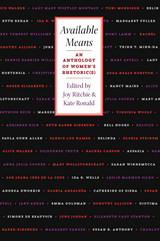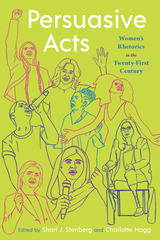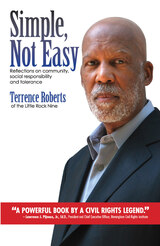3 books about Speeches, addresses, etc

Available Means
An Anthology Of Women'S Rhetoric(s)
Joy Ritchie
University of Pittsburgh Press, 2001
“I say that even later someone will remember us.”—Sappho, Fragment 147, sixth century, BC
Sappho’s prediction came true; fragments of work by the earliest woman writer in Western literate history have in fact survived into the twenty-first century. But not without peril. Sappho’s writing remains only in fragments, partly due to the passage of time, but mostly as a result of systematic efforts to silence women’s voices. Sappho’s hopeful boast captures the mission of this anthology: to gather together women engaged in the art of persuasion—across differences of race, class, sexual orientation, historical and physical locations—in order to remember that the rhetorical tradition indeed includes them.
Available Means offers seventy women rhetoricians—from ancient Greece to the twenty-first century—a room of their own for the first time. Editors Joy Ritchie and Kate Ronald do so in the feminist tradition of recovering a previously unarticulated canon of women’s rhetoric. Women whose voices are central to such scholarship are included here, such as Aspasia (a contemporary of Plato’s), Margery Kempe, Margaret Fuller, and Ida B. Wells. Added are influential works on what it means to write as a woman—by Virginia Woolf, Adrienne Rich, Nancy Mairs, Alice Walker, and Hélène Cixous. Public “manifestos” on the rights of women by Hortensia, Mary Astell, Maria Stewart, Sarah and Angelina Grimké, Anna Julia Cooper, Margaret Sanger, and Audre Lorde also join the discourse.
But Available Means searches for rhetorical tradition in less obvious places, too. Letters, journals, speeches, newspaper columns, diaries, meditations, and a fable (Rachel Carson’s introduction to Silent Spring) also find places in this room. Such unconventional documents challenge traditional notions of invention, arrangement, style, and delivery, and blur the boundaries between public and private discourse. Included, too, are writers whose voices have not been heard in any tradition. Ritchie and Ronald seek to “unsettle” as they expand the women’s rhetorical canon.
Arranged chronologically, Available Means is designed as a classroom text that will allow students to hear women speaking to each other across centuries, and to see how women have added new places from which arguments can be made. Each selection is accompanied by an extensive headnote, which sets the reading in context. The breadth of material will allow students to ask such questions as “How might we define women’s rhetoric? How have women used and subverted traditional rhetoric?”
A topical index at the end of the book provides teachers a guide through the rhetorical riches. Available Means will be an invaluable text for rhetoric courses of all levels, as well as for women’s studies courses.
Sappho’s prediction came true; fragments of work by the earliest woman writer in Western literate history have in fact survived into the twenty-first century. But not without peril. Sappho’s writing remains only in fragments, partly due to the passage of time, but mostly as a result of systematic efforts to silence women’s voices. Sappho’s hopeful boast captures the mission of this anthology: to gather together women engaged in the art of persuasion—across differences of race, class, sexual orientation, historical and physical locations—in order to remember that the rhetorical tradition indeed includes them.
Available Means offers seventy women rhetoricians—from ancient Greece to the twenty-first century—a room of their own for the first time. Editors Joy Ritchie and Kate Ronald do so in the feminist tradition of recovering a previously unarticulated canon of women’s rhetoric. Women whose voices are central to such scholarship are included here, such as Aspasia (a contemporary of Plato’s), Margery Kempe, Margaret Fuller, and Ida B. Wells. Added are influential works on what it means to write as a woman—by Virginia Woolf, Adrienne Rich, Nancy Mairs, Alice Walker, and Hélène Cixous. Public “manifestos” on the rights of women by Hortensia, Mary Astell, Maria Stewart, Sarah and Angelina Grimké, Anna Julia Cooper, Margaret Sanger, and Audre Lorde also join the discourse.
But Available Means searches for rhetorical tradition in less obvious places, too. Letters, journals, speeches, newspaper columns, diaries, meditations, and a fable (Rachel Carson’s introduction to Silent Spring) also find places in this room. Such unconventional documents challenge traditional notions of invention, arrangement, style, and delivery, and blur the boundaries between public and private discourse. Included, too, are writers whose voices have not been heard in any tradition. Ritchie and Ronald seek to “unsettle” as they expand the women’s rhetorical canon.
Arranged chronologically, Available Means is designed as a classroom text that will allow students to hear women speaking to each other across centuries, and to see how women have added new places from which arguments can be made. Each selection is accompanied by an extensive headnote, which sets the reading in context. The breadth of material will allow students to ask such questions as “How might we define women’s rhetoric? How have women used and subverted traditional rhetoric?”
A topical index at the end of the book provides teachers a guide through the rhetorical riches. Available Means will be an invaluable text for rhetoric courses of all levels, as well as for women’s studies courses.
[more]

Persuasive Acts
Women's Rhetorics in the Twenty-First Century
Shari Stenberg and Charlotte Hogg
University of Pittsburgh Press, 2020
In June 2015, Bree Newsome scaled the flagpole in front of South Carolina’s state capitol and removed the Confederate flag. The following month, the Confederate flag was permanently removed from the state capitol. Newsome is a compelling example of a twenty-first-century woman rhetor, along with bloggers, writers, politicians, activists, artists, and everyday social media users, who give new meaning to Aristotle’s ubiquitous definition of rhetoric as the discovery of the “available means of persuasion.” Women’s persuasive acts from the first two decades of the twenty-first century include new technologies and repurposed old ones, engaged not only to persuade, but also to tell their stories, to sponsor change, and to challenge cultural forces that repress and oppress.
Persuasive Acts: Women’s Rhetorics in the Twenty-First Century gathers an expansive array of voices and texts from well-known figures including Hillary Rodham Clinton, Malala Yousafzai, Michelle Obama, Lindy West, Sonia Sotomayor, and Chimamanda Ngozi Adichie, so that readers may converse with them, and build rhetorics of their own. Editors Shari J. Stenberg and Charlotte Hogg have complied timely and provocative rhetorics that represent critical issues and rhetorical affordances of the twenty-first century.
Persuasive Acts: Women’s Rhetorics in the Twenty-First Century gathers an expansive array of voices and texts from well-known figures including Hillary Rodham Clinton, Malala Yousafzai, Michelle Obama, Lindy West, Sonia Sotomayor, and Chimamanda Ngozi Adichie, so that readers may converse with them, and build rhetorics of their own. Editors Shari J. Stenberg and Charlotte Hogg have complied timely and provocative rhetorics that represent critical issues and rhetorical affordances of the twenty-first century.
[more]

Simple Not Easy
Reflections on community social responsibility and tolerance
Terrence Roberts
Parkhurst Brothers, Inc., 2010
HE MADE HISTORY. HE TELLS THE TRUTHS HE KNOWS.
LEAD TITLE/Our National Conversation Series
----Margot Stern Strom, Executive Director, Facing History and Ourselves, Inc.
"Terrence Roberts challenges all of us to make the world more inclusive by adjusting our 'mental maps.' He reminds us that we will not achieve that long-sought beloved community until we recognize the value of each individual-until we affirm each other. Simple, NotEasy is one trailblazer's mingling of history and contemporary mattersto engage a new conversations on community, social responsibility and tolerance. A powerful book by a civil rights legend."
--- Lawrence J. Pijeaux, Jr., Ed.D.,
[more]
READERS
Browse our collection.
PUBLISHERS
See BiblioVault's publisher services.
STUDENT SERVICES
Files for college accessibility offices.
UChicago Accessibility Resources
home | accessibility | search | about | contact us
BiblioVault ® 2001 - 2024
The University of Chicago Press









